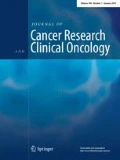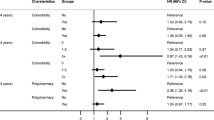Abstract
Purpose
With the increasing number of elderly patients suffering from cancer, comorbidity and functional impairment become common problems in patients with cancer. Both comorbidity and functional impairment are associated with a shorter survival time in cancer patients, but their independent role has rarely been addressed before.
Methods
Within a prospective trial we recruited 427 cancer patients, irrespective of age and type of cancer, admitted as inpatients prior to the start of chemotherapy. Comorbidity was assessed with the cumulative illness rating scale (CIRS-G), functional impairment with WHO performance status (WHO-PS), basal (ADL) and instrumental (IADL) activities of daily living.
Results
Median follow-up was 34.2 months. A total, 61.4%. of patients died. Median survival time was 21.0 months. Age, kind of tumour (solid vs. haematological), treatment approach (non-curative vs. curative), WHO-PS (2–4 vs. 0–1), IADL (<8 vs. 8), and severe comorbidity (CIRS-level 3–4 vs. none) were significantly associated with shorter survival time in univariate analysis. In a multivariate Cox-regression-analysis, age (HR 1.019; 95%-CI 1.007–1.032; P = 0.003), kind of tumour (HR 1.832; 95%-CI 1.314–2.554; P < 0.001), WHO-PS (HR 1.455; 95%-CI 1.059–2.000; P = 0.021), and comorbidity level 3–4 (HR 1.424; 95%-CI 1.012–2.003; P = 0.043) maintained their significant association.
Conclusions
Age, severe comorbidity, functional impairment, and kind of tumour are independently related to shorter survival time in cancer patients.

Similar content being viewed by others
References
Boulos DL, Groome PA, Brundage MD et al (2006) Predictive validity of five comorbidity indices in prostate carcinoma patients treated with curative intent. Cancer 106(8):1804–1814
Boyd CM, Darer J, Boult C, Fried LP, Boult L, Wu AW (2005) Clinical practice guidelines and quality of care for older patients with multiple comorbid diseases: implications for pay for performance. Jama 294(6):716–724
Buccheri G, Ferrigno D, Tamburini M (1996) Karnofsky ECOG performance status scoring in lung cancer: a prospective, longitudinal study of 536 patients from a single institution. Eur J Cancer 32A(7):1135–1141
Charlson ME, Pompei P, Ales KL, MacKenzie CR (1987) A new method of classifying prognostic comorbidity in longitudinal studies: development and validation. J Chronic Dis 40(5):373–383
Edwards BK, Howe HL, Ries LA et al (2002) Annual report to the nation on the status of cancer, 1973–1999, featuring implications of age and aging on US cancer burden. Cancer 94(10):2766–2792
Extermann M, Overcash J, Lyman GH, Parr J, Balducci L (1998) Comorbidity and functional status are independent in older cancer patients. J Clin Oncol 16(4):1582–1587
Extermann M, Aapro M, Bernabei R et al (2005) Use of comprehensive geriatric assessment in older cancer patients: recommendations from the task force on CGA of the International Society of Geriatric Oncology (SIOG). Crit Rev Oncol Hematol 55(3):241–252
Feinstein AR (1970) The pre-therapeutic classification of co-morbidity in chronic disease. J Chronic Dis 23:455–469
Firat S, Bousamra M, Gore E, Byhardt RW (2002a) Comorbidity and KPS are independent prognostic factors in stage I non-small-cell lung cancer. Int J Radiat Oncol Biol Phys 52(4):1047–1057
Firat S, Byhardt RW, Gore E (2002b) Comorbidity and Karnofksy performance score are independent prognostic factors in stage III non-small-cell lung cancer: an institutional analysis of patients treated on four RTOG studies. Radiation Therapy Oncology Group. Int J Radiat Oncol Biol Phys 54(2):357–364
Fried LP, Ferrucci L, Darer J, Williamson JD, Anderson G (2004) Untangling the concepts of disability, frailty, and comorbidity: implications for improved targeting and care. J Gerontol A Biol Sci Med Sci 59(3):255–263
Friedrich C, Kolb G, Wedding U, Pientka L (2003) Comprehensive geriatric assessment in the elderly cancer patient. Onkologie 26(4):355–360
Gross CP, McAvay GJ, Krumholz HM, Paltiel AD, Bhasin D, Tinetti ME (2006) The effect of age and chronic illness on life expectancy after a diagnosis of colorectal cancer: implications for screening. Ann Int Med 145(9):646–653
Hurria A, Gupta S, Zauderer M, et al (2005) Developing a cancer-specific geriatric assessment: a feasibility study. Cancer 104(9):1998–2005
Jemal A, Siegel R, Ward E et al (2006) Cancer statistics, 2006. CA Cancer J Clin 56(2):106–130
Karnofsky DA, Adelmann WH, Craver FL (1948) The use of nitrogen mustard in the palliative treatment of carcinoma. Cancer 1:634–656
Lawton MP, Brody EM (1969) Assessment of older people: self-maintaining and instrumental activities of daily living. Gerontologist 9(3):179–186
Linn BS, Linn MW, Gurel L (1968) Cumulative illness rating scale. J Am Geriatr Soc 16(5):622–626
Mahoney FI, Barthel DW (1965a) Functional evaluation. Md Med J 14:61–65
Mahoney FI, Barthel DW (1965b) Functional evaluation: the barthel index. Md State Med J 14:61–65
Maione P, Perrone F, Gallo C et al (2005) Pretreatment quality of life and functional status assessment significantly predict survival of elderly patients with advanced non-small-cell lung cancer receiving chemotherapy: a prognostic analysis of the multicenter Italian lung cancer in the elderly study. J Clin Oncol 23(28):6865–6872
Nagel G, Wedding U, Rohrig B, Katenkamp D (2004) The impact of comorbidity on the survival of postmenopausal women with breast cancer. J Cancer Res Clin Oncol 130(11):664–670
Read WL, Tierney RM, Page NC et al (2004) Differential prognostic impact of comorbidity. J Clin Oncol 22(15):3099–3103
Repetto L, Venturino A, Vercelli M et al (1998) Performance status and comorbidity in elderly cancer patients compared with young patients with neoplasia and elderly patients without neoplastic conditions (see comments). Cancer 82(4):760–765
Repetto L, Fratino L, Audisio RA et al (2002) Comprehensive geriatric assessment adds information to Eastern Cooperative Oncology Group performance status in elderly cancer patients: an Italian Group for Geriatric Oncology Study. J Clin Oncol 20(2):494–502
Rubenstein LZ, Siu AL, Wieland D (1989) Comprehensive geriatric assessment: toward understanding its efficacy. Aging (Milano) 1(2):87–98
Satariano WA, Ragland DR (1994) The effect of comorbidity on 3-year survival of women with primary breast cancer. Ann Int Med 120(2):104–110
Truong PT, Kader HA, Lacy B et al (2005) The effects of age and comorbidity on treatment and outcomes in women with endometrial cancer. Am J Clin Oncol 28(2):157–164
Turner NJ, Haward RA, Mulley GP, Selby PJ (1999) Cancer in old age–is it inadequately investigated and treated? BMJ 319(7205):309–312
Wedding U, Rohrig B, Klippstein A, Fricke HJ, Sayer HG, Hoffken K (2006) Impairment in functional status and survival in patients with acute myeloid leukaemia. J Cancer Res Clin Oncol 132(10):665–671
World-Health-Organisation (1979) WHO handbook for reporting results of cancer treatment. WHO, Geneva
Yancik R, Wesley MN, Ries LA, Havlik RJ, Edwards BK, Yates JW (2001) Effect of age and comorbidity in postmenopausal breast cancer patients aged 55 years and older. Jama 285(7):885–892
Acknowledgment
The study was supported by German Cancer Aid (Grant No. 70-2445-Hö-3). Ulrich Wedding is currently research follow of the “Forschungskolleg Geriatrie” of the Robert Bosch Foundation, Stuttgart, Germany.
Author information
Authors and Affiliations
Corresponding author
Rights and permissions
About this article
Cite this article
Wedding, U., Röhrig, B., Klippstein, A. et al. Age, severe comorbidity and functional impairment independently contribute to poor survival in cancer patients. J Cancer Res Clin Oncol 133, 945–950 (2007). https://doi.org/10.1007/s00432-007-0233-x
Received:
Accepted:
Published:
Issue Date:
DOI: https://doi.org/10.1007/s00432-007-0233-x



